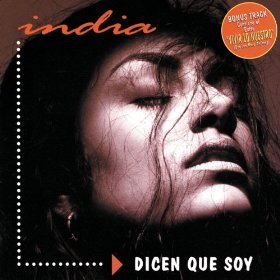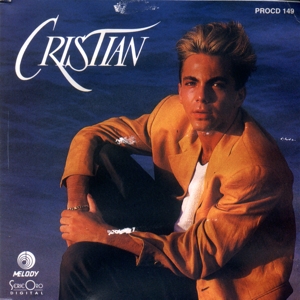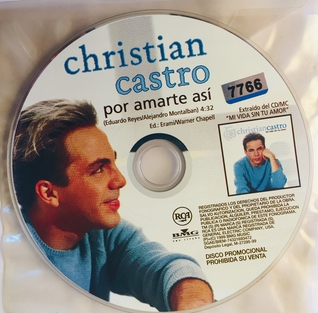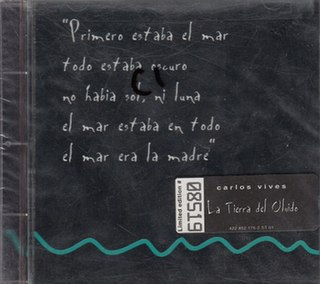Related Research Articles

Reik is a Mexican pop rock band from Mexicali, Baja California, formed in 2003 by Jesús Alberto Navarro Rosas, Julio Ramírez Eguía, and Gilberto Marín Espinoza (guitar). The group's first five albums have been classified as Latin pop, but the group has since transitioned to a more urban-influenced sound since 2015. Reik has won a Latin Billboard Music Award, four Los Premios MTV Latinoamérica awards, and a Latin Grammy.

Otra Nota is the debut album by American singer Marc Anthony that was released on January 26, 1993, by RMM Records. Produced by Sergio George, it was the first album by Anthony to record in salsa after starting his career as a freestyle musician. Recording of the album began after Anthony asked RMM president Ralph Mercado to record Juan Gabriel's "Hasta Que Te Conocí" in salsa after hearing it on the radio during a taxi ride. Recorded on a low budget, the album peaked at No. 2 on the Billboard Tropical Albums chart and reached No. 30 on the Billboard Top Latin Albums chart.

Todo a Su Tiempo is the second studio album by American recording artist Marc Anthony, released by RMM Records on May 31, 1995. The album was produced by Sergio George, who was also involved with production of Anthony's debut studio album, Otra Nota. The album comprises five new compositions, three of which were written by Omar Alfanno, and four cover versions. Eight singles were released from the album, all but one of which topped the Billboard Tropical Songs chart.

Gente de Zona is a Cuban reggaeton duo made up of musicians Alexander Delgado Hernández and Randy Malcom Martínez. In 2014, the duo gained success with the collaboration of Mario Proenza, who helped them record with Enrique Iglesias the song "Bailando". This hit gave the duo numerous prestigious awards like the Latin Grammy and Latin Billboard Awards.

Otro Día Más Sin Verte, also called Sentir in Spain, is the Spanish-language debut album by Cuban singer Jon Secada. It was released on October 6, 1992 by EMI Latin to coincide with his English-language self-titled debut album, which was released in April 1992. The idea to release an all Spanish-language album was pitched by Secada's music mentor Emilio Estefan, after realizing that SBK Records have yet released such an album. Estefan presented Secada's proposal for a Spanish-language recording to the head of SBK, Charles Koppelman and then president of EMI Latin Jose Behar. Koppelman accepted the proposal after Behar stated that he could see "market potential" for Secada. With the help of Emilio's wife, Gloria Estefan, Secada translated selected compositions from his English-language debut album for Otro Día Más Sin Verte.

Dicen Que Soy is the third studio album by Puerto Rican recording artist La India released on September 20, 1994 by RMM Records. The album was produced by American musician Sergio George, who chose the songs for India to record with an emphasis on feminism to suit with her voice. The production mixes salsa music with other rhythms such as funk and timba. Five singles were released from the record with "Nunca Voy a Olvidarte" and "Ese Hombre" topping the Billboard Tropical Songs chart.

"Mi Tierra" is a song by Cuban American singer Gloria Estefan, from her third studio album of the same name (1993). It was written by Estefano and the artist, with her husband Emilio Estefan, Jorge Casas, and Clay Ostwald handling the production. The song was released as the lead single from the album in 1993 by Epic Records. It is a son montuno track in which the singer narrates longing for her homeland. The song received positive reactions from music critics, who praised its arrangement.

El Regreso de los Reyes is the debut studio album by Mexican-American cumbia group Cruz Martínez y Los Super Reyes. It was released on August 14, 2007 by Warner Music Latina. The royal edition was released on September 16, 2008. It has all the songs from the standard edition except for "Roses". It includes two remixes for "Muévelo" and two remixes for "Si Pudiera". It came with a DVD that includes the music videos for "Muévelo", "Serenata ", "Muchacha Triste", and "Yo Seré". The album reached #130 on the United States Billboard 200 chart, and #3 on the United States Billboard Latin chart.

"Nunca Voy a Olvidarte" is a song written by Roberto Belester and first recorded by Mexican grupero band Bronco for their album Salvaje y Tierno (1991). In the song, the protagonist is leaving and vows to never forget the time he spent with his lover. In 1993, Mexican singer-songwriter Cristian Castro covered the song on his album, Un Segundo en el Tiempo. Castro's version peaked at number-one on the Billboard Hot Latin Songs chart in the United States became his first number-one single.

"Por Amarte Así" is a song written by Alejandro Montalbán and Eduardo Reyes and performed by Mexican recording artist Cristian Castro. It was produced by Kike Santander and released in 2000 as the fourth single from his sixth studio album Mi Vida Sin Tu Amor (1999). Lyrically, the song is about a man who promises to keep loving his lover even though she is gone. In the United States, it peaked at number three and two on the Billboard Hot Latin Songs and Latin Pop Songs charts and received a Billboard Latin Music nomination for Pop Track of the Year. "Por Amarte Así" was the fifth best-performing Latin single of 2001 in the United States.
"Hasta Que Te Conocí" is a song written, produced, and performed by Mexican singer-songwriter Juan Gabriel. It was released in 1986 as the third single from his studio album Pensamientos. In the song, the protagonist learns the meaning of suffering after meeting a lover who mistreats him. It peaked at number two on the Billboard Hot Latin Song chart. A live version of the song was included on his album En el Palacio de Bellas Artes (1990) which peaked at number ten on the Hot Latin Songs chart.

"Es Demasiado Tarde" is a song written and performed by Mexican singer-songwriter Ana Gabriel. It was released in 1990 by CBS Records and first included on the compilation album México, Voz y Sentimiento which also featured songs performed by Luis Angel, Vikki Carr, Aida Cuevas, Lorenzo de Monteclaro, Antonio De Jesús, Pedro Fernández, Hermanas Huerta, Tania Libertad, Angelica Maria, Lucía Méndez, Angeles Ochoa, Gilberto Parra, Gerardo Reyes, Cuco Sánchez, Cecilia Toussaint, Yuri and Flor Yvon. The song became Gabriel's fourth number-one single in the Billboard Top Latin Songs chart, after "Ay Amor", "Simplemente Amigos" and "Quién Como Tú". Personalidad: 20 Éxitos was the first Gabriel album to include the song. "Es Demasiado Tarde" is a song about a woman who refuses to take her lover back after the end of their relationship. Gabriel also addressed this issue in her song "Tú lo Decidiste" in 1994. The song earned the Lo Nuestro Award for Best Pop Song.

"Cosas del Amor" is a song by American recording artist Vikki Carr and Mexican singer-songwriter Ana Gabriel. It was released as the lead single from Carr's studio album Cosas del Amor (1991). Written by Roberto Livi and Rudy Pérez, the song portrays the relationship between two friends and confidences between both due to marital problems of one of them.

"Mañana, Mañana" is a song written by Mexican singer-songwriter Juan Gabriel. Argentine singer Libertad Lamarque performed the song in the Mexican movie La loca de los milagros. Juan Gabriel released his recording of the song, a duet with Estela Nuñez, on his album Ella (1979). The song describes the departure of a lost love who will never return.
"Detrás de Mi Ventana" is a Latin pop song by Mexican recording artist Yuri from her studio album Nueva Era (1993). The track was written by Guatemalan singer-songwriter Ricardo Arjona. It was released as the lead single in Latin America and the United States, peaking atop the Billboard's Latin Songs chart, becoming the third number-one song in the chart for the singer and the first for Arjona as a songwriter.
The 25th Lo Nuestro Awards ceremony, presented by the American network Univision, honored the best Latin music of 2012 in the United States and took place on February 21, 2013, at the American Airlines Arena in Miami, Florida beginning at 5:00 p.m. PST / 8:00 p.m. EST. During the ceremony, Lo Nuestro Awards were presented in 33 categories. The ceremony, televised in the United States by Univision, was produced by Antonio Guzmán. Mexican performers Ninel Conde and Pedro Fernández hosted the show.
"De Contrabando" ("Smuggled") is a song written by Joan Sebastian. It was first performed by Mexican singer Imelda, and included on her album Aparentemente, released in 1991. Six years later, was performed by fellow Mexican singer Zayda Y Los Culpables and released by Musart Records as the second single from her self-titled album in 1997. Mexican-American singer Jenni Rivera recorded a cover version for her studio album Parrandera, Rebelde y Atrevida. "De Contrabando" was released as the second single from the album in 2006. In the United States, the song peaked at number fourteen on the Billboard Hot Latin Songs chart and number one on the Billboard Regional Mexican Songs chart. The song was nominated for a Lo Nuestro Award for Regional Mexican Song of the Year at the 2007 Lo Nuestro Awards. Rivera was also recognized for Regional Mexican Female Artist of the Year. Rivera was also awarded Regional Mexican Airplay Song of the Year for at the 2007 Latin Billboard Music Awards.
The 6th Lo Nuestro Awards ceremony, presented by the Univision, honored the best Latin music of 1993 and 1994 and took place on May 19, 1994, at a live presentation held at the James L. Knight Center in Miami, Florida. The ceremony was broadcast in the United States and Latin America by Univision.
This is a list of notable events in Latin music that took place in 1993.

"La Tierra del Olvido" is a song by Colombian singer Carlos Vives from his seventh studio album of the same name (1995). The song was written by Iván Benavides and Vives, who handled production alongside Richard Blair. It was released as the lead single from the album in 1995. The song is a neo-vallenato number that utilizes the folk guitar and accordion, on which Vives longs for his homeland. The song received positive reactions from three music critics, being found as one of the album's catchiest tunes by them. It was a recipient at the ASCAP Latin Awards in 1996.
References
- ↑ "Caramelo - Los Fantasmas del Caribe". AllMusic. Rovi. Retrieved August 20, 2014.
- ↑ "Los Fantasmas del Caribe - Chart history: Latin Songs". Billboard. Prometheus Global Media. Retrieved June 8, 2013.
- ↑ "Topping The Charts Year By Year". Billboard. Nielsen Business Media, Inc. 110 (48): LMQ3. November 28, 1998. Retrieved March 3, 2010.
- ↑ González, Fernando (May 16, 1994). "Lo Nuestro, Billboard Honor Latin Singers". The Miami Herald . The McClatchy Company.